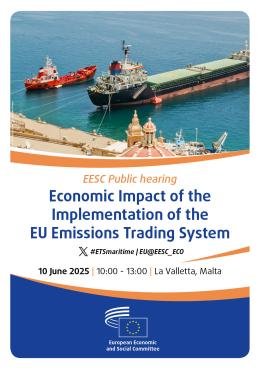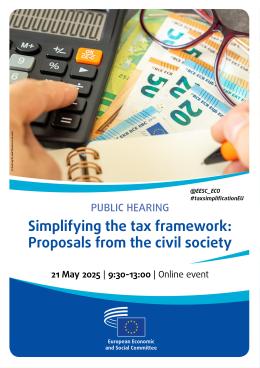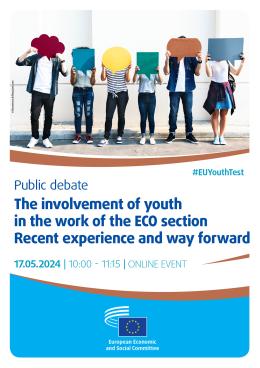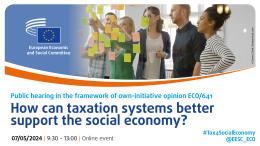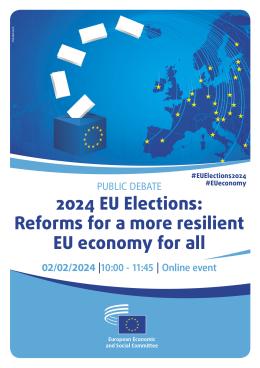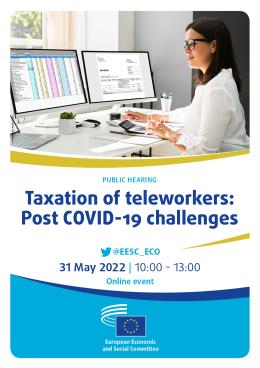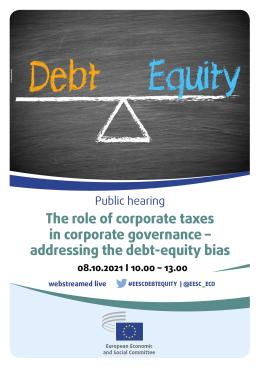European Economic
and Social Committee
Main navigation
-
Acerca de
ABOUT
The European Economic and Social Committee (EESC) is the voice of organised civil society in Europe.
Find out more about its role and structure at http://www.eesc.europa.eu/en/about
- Organización política
- Organización administrativa
- COOPERACIÓN CON OTRAS INSTITUCIONES
- Rules
-
Nuestro trabajo
OUR WORK
The EESC issues between 160 and 190 opinions and information reports a year.
It also organises several annual initiatives and events with a focus on civil society and citizens’ participation such as the Civil Society Prize, the Civil Society Days, the Your Europe, Your Say youth plenary and the ECI Day.
Find the latest EESC opinions and publications at http://www.eesc.europa.eu/en/our-work/opinions-information-reports/opinions and http://www.eesc.europa.eu/en/our-work/publications-other-work/publications respectively.
- Dictámenes y documentos informativos
- Documentos
- Publicaciones y otros trabajos
-
Participación de los ciudadanos y de la sociedad civil
- Civil Society Week
- European elections 2024
- Premio de la Sociedad Civil
- The Conference on the Future of Europe
- Pasaporte democrático europeo
- Tu Europa, tu voz
- Iniciativa Ciudadana Europea (ICE)
- The path to our industrial future
- Youth Climate and Sustainability Round Tables
- EU Organic Awards
- Civil Society Against COVID 19
- EESC stands with Ukraine
- Partnerships
- Relations with ESCs
-
Políticas
POLICIES
The EESC is active in a wide range of areas, from social affairs to economy, energy and sustainability.
Learn more about our policy areas and policy highlights at http://www.eesc.europa.eu/en/policies
-
Ámbitos políticos
- Agricultura, desarrollo rural y pesca
- Acción por el clima
- Política de cohesión, regional y urbana
- Consumidores
- Sociedad de la información y cambio digital
- Unión económica y monetaria
- Educación y formación
- Empleo
- Energía
- Empresa
- Medio ambiente
- Relaciones exteriores
- Servicios financieros y mercados de capitales
- Derechos fundamentales y derechos de los ciudadanos
- Housing
- Industria y transformaciones industriales
- Asuntos institucionales y presupuesto de la UE
- Migración y asilo
- Investigación e innovación
- Servicios de interés general
- Mercado único
- Asuntos sociales
- Desarrollo sostenible
- Fiscalidad
- Transportes
- De actualidad
-
Ámbitos políticos
-
Agenda
AGENDA
The EESC holds nine plenary sessions per year. It also organises many conferences, public hearings and high-level debates related to its work.
Find out more about our upcoming events at http://www.eesc.europa.eu/en/agenda/our-events/upcoming-events
- Nuestros actos
-
Noticias y medios de comunicación
NEWS & MEDIA
Here you can find news and information about the EESC'swork, including its social media accounts, the EESC Info newsletter, photo galleries and videos.
Read the latest EESC news http://www.eesc.europa.eu/en/news-media/news and press releases http://www.eesc.europa.eu/en/news-media/press-releases
- President
-
Miembros y Grupos
MEMBERS & GROUPS
The EESC brings together representatives from all areas of organised civil society, who give their independent advice on EU policies and legislation. The EESC's326 Members are organised into three groups: Employers, Workers and Various Interests.
Find out more about our Members and groups at http://www.eesc.europa.eu/en/members-groups
- Miembros
- Grupos
-
Secciones y otros órganos
SECTIONS & OTHER BODIES
The EESC has six sections, specialising in concrete topics of relevance to the citizens of the European Union, ranging from social to economic affairs, energy, environment, external relations or the internal market.
Find out more at http://www.eesc.europa.eu/en/sections-other-bodies
-
Secciones / CCMI
- Unión Económica y Monetaria y Cohesión Económica y Social (ECO)
- Mercado Único, Producción y Consumo (INT)
- Transportes, Energía, Infraestructuras y Sociedad de la Información (TEN)
- Empleo, Asuntos Sociales y Ciudadanía (SOC)
- Agricultura, Desarrollo Rural y Medio Ambiente (NAT)
- Relaciones Exteriores (REX)
- Comisión Consultiva de las Transformaciones Industriales (CCMI)
- Observatorios
- Otros
-
Secciones / CCMI
- Ukraine

